Inaugural WashU Medicine Dean’s Medals honor extraordinary contributions (Links to an external site)
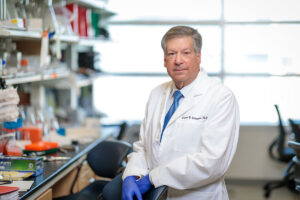
Department of


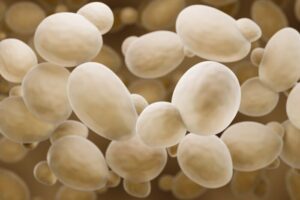
Researchers at WashU Medicine shrink gastrointestinal tumors in mice using a yeast probiotic to deliver immunotherapy to the gut, offering a potentially novel strategy to target hard-to-reach gut cancers.

Researchers at WashU Medicine have found a process by which the brain guards against attack by the immune system. In mice with multiple sclerosis, such “guardian” proteins that train the immune system were drastically depleted, and replenishing them improved symptoms, according to a study in Nature.

Many laboratories are interested in harnessing the immune system to treat one of today’s most pressing health concerns: obesity. Steven Van Dyken, an immunologist at the Washington University School of Medicine in St. Louis, Missouri, has been studying an immune response usually triggered in response to allergens and parasites, to see whether it could help to regulate metabolism.

The Department of Pathology and Immunology at Washington University in St. Louis is proud to announce that two of our faculty members, Joseph Corbo, MD, PhD and Gautam Dantas, PhD have played significant roles in the groundbreaking research that contributed to this year’s Nobel Prize recipients in Physiology or Medicine and Chemistry. Joseph Corbo’s Collaboration […]
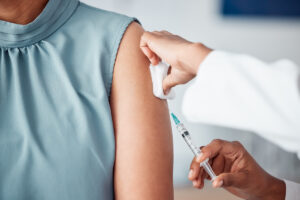
Researchers at WashU Medicine have received a $12 million grant from the National Institute of Allergy and Infectious Diseases to identify the factors that are responsible for long-lasting immunity against disease.

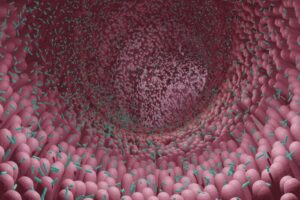
Researchers at Washington University School of Medicine in St. Louis have found that a strain of gut bacteria can boost immune responses and enhance cancer immunotherapy to fight sarcoma tumors in mice. This paper also demonstrates the power of collaboration from leaders in the fields of immunology, cancer immune therapy, and gut microbiome. https://medicine.wustl.edu/news/gut-bacteria-boost-immune-response-to-fight-tumors/
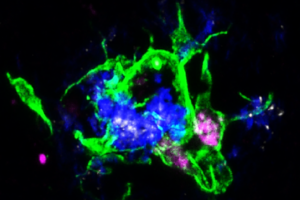
Alzheimer’s disease starts with a sticky protein called amyloid beta that builds up into plaques in the brain, setting off a chain of events that results in brain atrophy and cognitive decline. The new generation of Alzheimer’s drugs — the first proven to change the course of the disease — work by tagging amyloid for […]
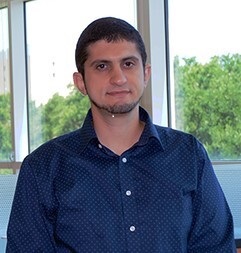
Dr. Ammar Abdelrahman, a post-doctoral researcher in the lab of Dr. Kodi Ravichandran, has received a one-year grant from the Knights Templar Eye Foundation for his project “Targeting Retinal Glial Efferocytosis as a Novel Intervention Strategy in Retinopathy of Prematurity.”
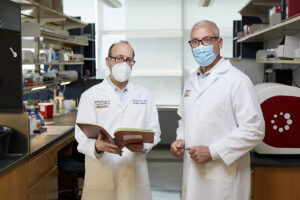
This episode of ‘Show Me the Science’ details how School of Medicine scientists began working with the virus, ramping up research efforts while the rest of the world was shutting down.

Jeffrey I. Gordon, MD, has been awarded the George M. Kober Medal from the Association of American Physicians in recognition of his outstanding contributions to the field of gut microbiome research. Gordon, director of the Edison Family Center for Genome Sciences & Systems Biology at Washington University School of Medicine in St. Louis, is considered to be […]
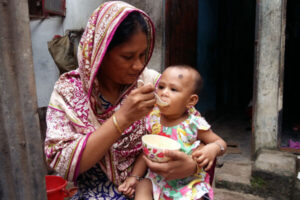
A new type of therapeutic food specifically designed to repair the gut microbiomes of malnourished children is superior to standard therapy in promoting growth, according to the results of a proof-of-concept clinical trial conducted in Bangladesh.
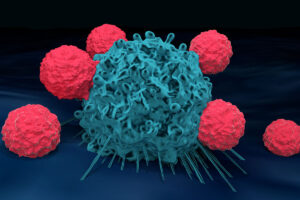
The Zika virus that ravaged the Americas, leaving many babies with permanent brain damage, may have a silver lining. The virus can activate immune cells to destroy an aggressive brain cancer in mice, giving a powerful boost to an immunotherapy drug and sparking long-lasting immunological memory that can ward off tumor recurrence for at least […]
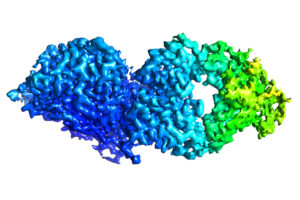
Researchers have identified two antibodies that protect mice against lethal infections of influenza B virus, report scientists at Washington University School of Medicine in St. Louis and Icahn School of Medicine at Mount Sinai. Together with an antibody that targets the other major kind of influenza viruses that infect people — influenza A — these […]
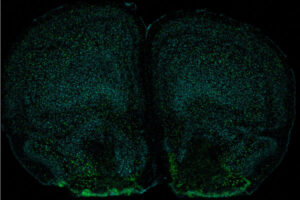
New research at Washington University School of Medicine in St. Louis helps illuminate a surprising mind-body connection. In mice, the researchers found that immune cells surrounding the brain produce a molecule that is then absorbed by neurons in the brain, where it appears to be necessary for normal behavior.
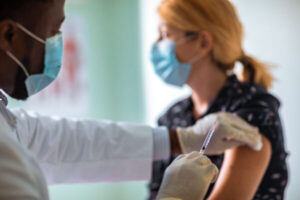
Flu season comes around like clockwork every year, and sooner or later everyone gets infected. The annual flu shot is a key part of public health efforts to control the flu, but the vaccine’s effectiveness is notoriously poor, falling somewhere from 40% to 60% in a typical year.
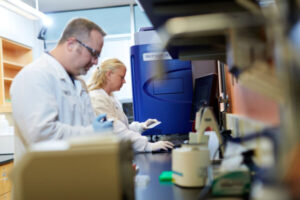
A new saliva test to detect the SARS-CoV-2 virus has been developed by researchers at Washington University School of Medicine in St. Louis. Results from the COVID-19 diagnostic test are available in a few hours and, ideally, able to be communicated to people tested within a day. Highly sensitive to detecting even tiny levels of […]
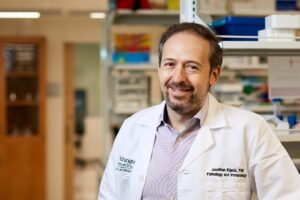
As the brain reigns supreme over the human body, the immune system works 24/7 to defend the body from foreign invaders. For decades, however, the brain and the immune system were thought to operate independently of one another. But a growing body of evidence suggests the two are intimately connected in keeping the body healthy.
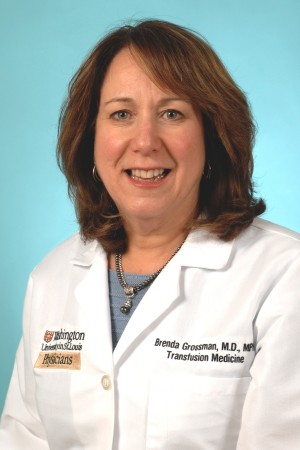
Two Washington University doctors have been leading a national effort to study convalescent plasma, a centuries-old treatment for infectious diseases, and believe they have submitted enough data to secure federal approval for emergency use against COVID-19.

On Sunday, 60 Minutes featured our own Jeff Gordon, who discussed the gut microbiome and its connection to nutritional health, including the use of probiotics. The possibility of improving health by manipulating the microbiome could provide many benefits to individuals suffering from a host of health conditions. Last year, Gordon’s team reported that a special […]
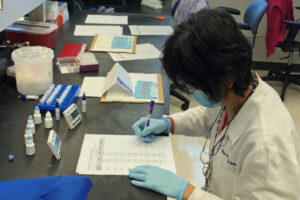
With Brazil leading the world in newly diagnosed COVID-19 cases, Latin America has become the epicenter of the coronavirus pandemic. Meanwhile, outbreaks continue to escalate in parts of Asia, Africa and the Middle East. Public health authorities worldwide desperately need to expand testing so they can track the spread of the infection, but molecular diagnostic […]
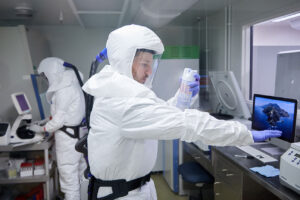
The global effort to quickly develop drugs and vaccines for COVID-19 has been hampered by limited numbers of laboratory mice that are susceptible to infection with SARS-CoV-2, the virus that causes COVID-19. Now, researchers at Washington University School of Medicine in St. Louis report they have developed a mouse model of COVID-19 that replicates the […]
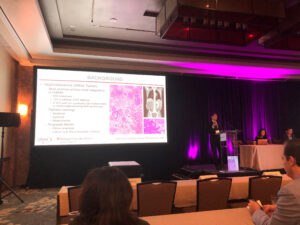
An abstract co-authored and entitled, “PD-L1/PD-1 Expression in Wilms Tumor: Analysis of 52 cases” has won the Gordon F. Vawter Pathologist-in-Training Award at the Society for Pediatric Pathology 2020 at its Spring Meeting in Los Angeles, CA. The award recognizes meritorious work presented by Jeff Chen, MD based on research conducted by a group of […]
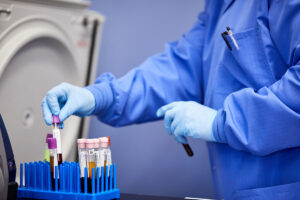
As stay-at-home orders are lifted around the country and public life begins to return, health experts continue to emphasize the importance of testing for COVID-19 to prevent a second – and potentially worse – wave of infections.
$60,000 in grants awarded to faculty in Pathology & Immunology Grants Rafa Sanguinetti Czepielewski, PhD, Postdoc Research Associate in the Randolph Lab, received a one-year $60,000 grant from the Lawrence C. Pakula, MD IBD Education, and Innovation Fund, entitled “Role of Mesenteric Tertiary Lymphoid Organs in Inflammatory Bowel Disease Progression and Anti-TNF Resistance”. Noteworthy Jack […]
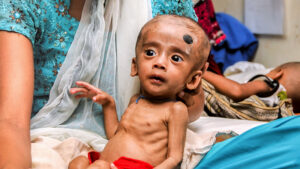
Work from the lab of Jeffery Gordon, MD was recently featured in Science as a runner up for Breakthrough of The Year. This title is awarded yearly by the journal Science to recognize significant discoveries or developments in scientific research. The journal highlighted work by Arjun Raman, MD, PhD (PGY3 Clinical Pathology Resident) and others […]
Over $3 million in grants awarded to faculty in Pathology & Immunology. GRANTS Cole John Ferguson, MD, Instructor in Pathology and Immunology, received a five-year $164,015 grant from The National Institutes of Health, entitled “Ubiquitin Signaling in Epigenetic Regulation of Neuronal Development”. Chang Liu, MD, PhD, Assistant Professor of Pathology and Immunology, received a two-year […]
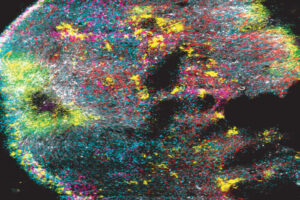
Cancer immunotherapy drugs trigger the body’s immune system to attack tumors and have revolutionized the treatment of certain cancers, such as lymphoma, lung cancer and melanoma. Yet, while some patients respond well to the drugs, others don’t respond at all. Cancer immunologists want to change that.
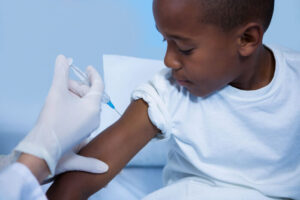
Researchers have found an antibody that protects mice against a wide range of lethal influenza viruses, according to a study from Washington University School of Medicine in St. Louis, Icahn School of Medicine at Mount Sinai in New York City, and Scripps Research in La Jolla, Calif. The antibody could serve as a template to […]
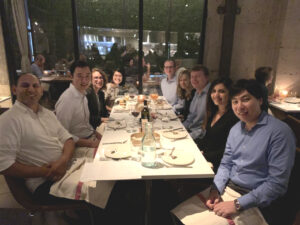
A number of Pathology & Immunology trainees and a faculty member had the amazing opportunity to present research at this year’s annual meeting of the American Society of Dermatopathology. The meeting was held October 17-20 in San Diego, CA. The experience, according to one trainee, was very educational, with lots of feedback on their work […]
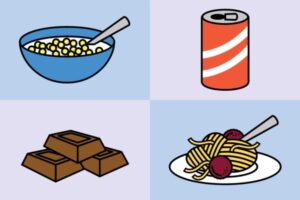
A specific microbe can break down a chemical common in manufactured foods
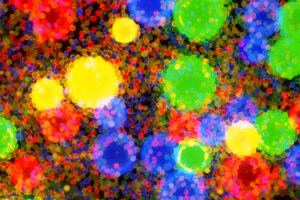
Certain human gut microbes with links to health thrive when fed specific types of ingredients in dietary fibers, according to a new study from Washington University School of Medicine in St. Louis.

Over $800,000 in grants awarded to faculty in Pathology & Immunology.
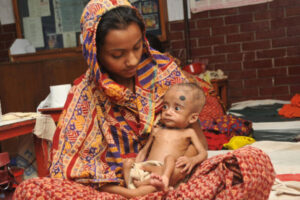
A new type of therapeutic food, specifically designed to repair the gut microbiomes of malnourished children, is superior to standard therapy in an initial clinical trial conducted in Bangladesh.
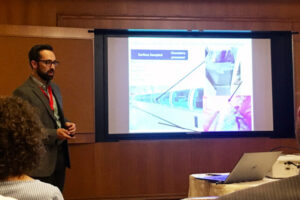
Eight trainees were awarded the Paul E. Strandjord Young Investigator Award, including Adam Bailey and Jonathan Brestoff who were recognized for their outstanding presentations.

The Department of Pathology & Immunology hosted its annual Trainee Research Day which celebrates research by residents and clinical fellows. It featured presentations both oral and poster from trainees.
Each year, women in the U.S. rely on some 20 million home pregnancy tests to learn potentially life-altering news.
Probiotics – which are living bacteria taken to promote digestive health – can evolve once inside the body and have the potential to become less effective and sometimes even harmful, according to a new study from Washington University School of Medicine in St. Louis.
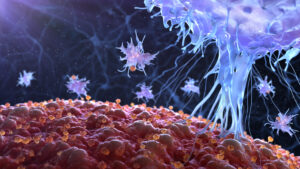
Eynav Klechevsky, assistant professor of pathology and immunology and Amit Pathak assistant professor of mechanical engineering & material science in the McKelvey School of Engineering at Washington University were awarded a three-year, $610,000 Trailblazer Award, from the National Institutes of Health’s National Institute of Biomedical Imaging and Bioengineering. This award provides funding to continue their […]
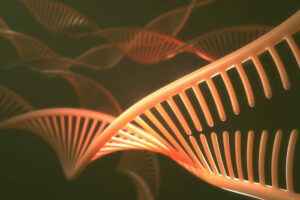
Study finds mimic for BRCA genes that could be targeted to improve treatment.